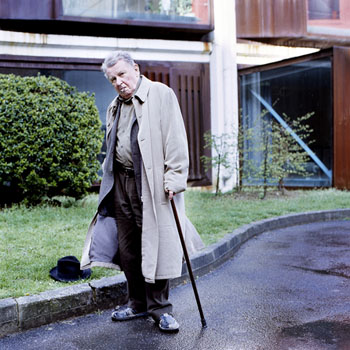“Bon anniversaire, Jean-Marie Straub!” wishes new filmkritik. As he turns 80, the Viennale and Vienna’s Stadtkino are presenting a program of four films, screening for free from the late afternoon through the evening: “Together with his wife Danièle Huillet, who died in 2008, over the past 50 years, Straub has made some of the most exciting, radical, and beautiful works of contemporary cinema. Films such as Nicht Versöhnt (Not Reconciled, 1965), Chronik der Anna Magdalena Bach (The Chronicle of Anna Magdalena Bach, 1968), Moses und Aron (Moses and Aaron, 1973), Trop tôt, trop tard (Too Early, Too Late, 1982), Der Tod des Empedokles (The Death of Empedocles, 1987), or Sicilia! (1999), to name just a few, are living examples, passionate provocations, and urgent proposals for a different new world.”
The Viennese daily Der Standard presents tributes from seven filmmakers (all in German, of course), beginning with Thom Andersen, who writes, “I love Jean-Marie and hate the world that’s made him a cult figure. I don’t know whether the cinema of Straub-Huillet is a popular cinema (will we ever know?), but it is a cinema of exhilarating life.”
Albert Serra recalls his years as a student, when he wanted to become a writer. It seemed to him, though, that it’d be a lonely profession and he felt drawn to people for whom an education was out of reach, “because, for me, they represented the best that this society has to offer, ethically as well as aesthetically.” Serra decided to make films. “To this day, I am convinced that I had no other choice.” But he counts himself lucky that he “did not yet know the work of Jean-Marie and Danièle. If I had, the possibility of making films would have eluded me. They developed precisely this connection, this relationship between language and people, between rhythm and gesture to its fullest aesthetic potential—with great accuracy and without any false sentiment. Now that I know their work better, it doesn’t make my own day-to-day work any easier. But what a paradox of fate that it’s the very same person whose work would seem to hinder mine would present a moral example that all but demands that I carry on.”
Michael Haneke rolls out a series of memories, beginning with: “I remember Straub and Huillet presenting their new film at the Cinemathèque in Paris and, because they found the audience too boring, carried on an argument—she in the audience and he on stage—of such humor and brilliance that it put us all to shame.”
Harun Farocki‘s piece is a quite detailed recollection of observing Straub and Huillet at work when he took on the role of Delamarche in Klassenverhältnisse (Class Relations, 1984), the way their work bent some of the rules of continuity, while respecting others.
Wim Wenders recalls meeting Straub and Huillet for the first time: “Here before me was the center of the world, the world of cinema at least.” Peter Nestler offers a three-line poem, John Gianvito, a “salute and an embrace from one of the many strangers for whom your work and example continues to matter very, very much.”
Further reading: Joel Rogers‘s 1976 interview for Jump Cut; Jonathan Rosenbaum on Écrits, a collection of writings by and interviews with Straub and Huillet; Daniel Fairfax (Senses of Cinema, 2009); Chris Fujiwara (Undercurrent, 2006); and Stoffel Debuysere‘s translations of essays by Jacques Rancière on Straub-Huillet from 2001 and 2004.
For news and tips throughout the day every day, follow @KeyframeDaily on Twitter and/or the RSS feed. Get Keyframe Daily in your inbox by signing in at fandor.com/daily.




